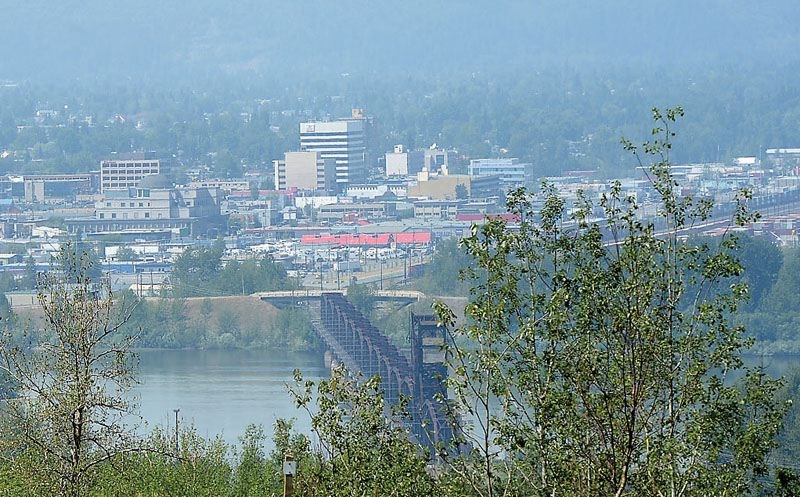A combination of provincial heat wave and wildfire smoke has raised health concerns across northern B.C.
Northern Health does not consider it an emergency situation at this point, but stresses that residents should take care of themselves and take care of each other under the circumstances.
"We are not telling people to stop exercising, just do things in moderation. Listen to your body. Use common sense," said Dr. William Osei, the region's medical health officer.
He urged people who wish to do outdoor activities, or feel compelled to be outside due to work or socialization, to rest in a cool, shaded place and drink frequently. Instead of exercising outside, use indoor facilities like the swimming pool instead of running or biking, or walking at the shopping mall, or activities at the Charles Jago Sports Centre or The Y to bring down your body temperature if you are starting to feel the signs of heat.
Some household actions to take, if air conditioning is not an option, is putting on a fan and even adding a cold, wet towel in front of the fan to chill the moving air. A cool shower or bath is also helpful.
He also called out the local population to check regularly on vulnerable residents they know, like elderly neighbours and family members, or people with chronic conditions that make them weaker in times of high heat and compromised air quality.
"Young children, old people and in the middle are people with chronic diseases - these are the three groups of people at highest risk," Osei said. "This happens every year, or the potential is there every year. This is nothing new for us. Those people with chronic conditions know already what their limits are and are taking their precautions. We want to remind our residents that life will go on as usual, we are not shutting down the north, and health effects are totally preventable using common sense."
Prince George had an air quality advisory issued last week and the advisory was extended to Fort St. John on Monday (see related story).
"The situation started to arise late last week as wildfires started to pump smoke into northern B.C.," said Ralph Adams, a Ministry of Environment air quality meteorologist. The situation persists "in basically all communities from Kamloops to Fort St. John. Echoing what Dr. Osei said, the important thing to remember is, during fire season this is to be expected and you should not rely on monitors in the larger centres as for what is going on [in smaller communities in the same region]."
Northern Health issues a statement on Monday to clarify that heat illness can occur when the humidex is at or near 40, or if there are extended periods of high temperatures. For all weather details in this area, log on to weatheroffice.gc.ca and click the Prince George icon on the map of Canada.
For more information on heat-related health issues, including heat exhaustion and heatstroke, call 8-1-1 for health advice 24/7, or visit www.healthlinkbc.ca.
"With the information we've got and the experience we have, you know your limits, you know your body," Dr. Osei said.
Symptoms of heat illness include rapid breathing, headache, weakness or fatigue, nausea and muscle cramps. People with these symptoms should move to a cool environment, rest, and drink cool, non-alcoholic beverages. If an individual's symptoms worsen or are severe, they should visit an emergency room or their family doctor.
MORE TIPS
- Watch or listen for humidex reports issued by Environment Canada.
- Drink lots of water and natural juices, even if you don't feel thirsty; avoid caffeinated beverages and alcohol, which can cause dehydration.
- Avoid strenuous activity during mid-day when the temperature is at its peak.
- Avoid going out in the blazing sun. If you must go out, stay in the shade or wear a hat.
- Apply a sunscreen with a Sun Protection Factor (SPF) of 15 or more for short trips outside.
- Upgrade to SPF 30 if you'll be spending long periods in direct sun.
- Apply sunscreen 15 to 30 minutes before exposure, using waterproof sunscreen if you sweat heavily or plan to swim.
- Use a fan to bring in cooler air from outside.
- Check on relatives, friends and neighbors who live alone, have difficulty caring for themselves, or are immobile to ensure they aren't suffering from the heat.
- Never leave infants, small children or pets in a parked car.
- Check with your doctor or pharmacist to see any medication you might take put you at higher risk for developing heat-related illness.


.png;w=120;h=80;mode=crop)
